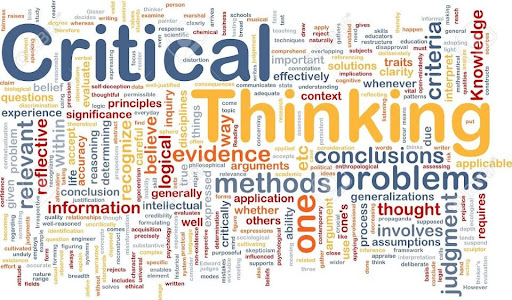Critical thinking activities
 The following section of the site has materials that your teacher may choose to share with you. Each of these activities encourages you to think critically about the theories and studies in this unit.
The following section of the site has materials that your teacher may choose to share with you. Each of these activities encourages you to think critically about the theories and studies in this unit.
In order for you to see the materials for this unit, your teacher will have to share them with you.
What is critical thinking?
There are several ways that you can demonstrate critical thinking. This list is just a start of the types of activities you may be asked to do to demonstrate both conceptual understanding (see below) and critical thinking:
- Evaluate the strengths and limitations of a study.
- Develop criteria for evaluating a theory
- Brainstorm solutions to a problem, based on your knowledge of psychology
- Rank arguments or research in terms of strength, validity, or ethics.
- Evaluate research proposals
- Identify the underlying assumptions of an argument
- Propose a research plan to test a theory
- Defend a position using evidence
- Generate questions that would be asked by psychologists from different approaches or fields of psychology
- Suggesting modifications of research studies
When discussing research and theories, it is important to think about how they address some of the key concepts in psychology. Below is a short list of potential conceptual strategies for discussing research.
Bias: Does the research demonstrate researcher bias? How do you know? Is there a cultural or gender bias in the research?
Causality: To what extent can we determine causality with regard to a theory or study?
Interaction: To what extent does the theory or study take a holistic approach to behaviour vs. a reductionist approach? Does the research demonstrate an interaction, for example, of biological and environmental factors?
Ethics: This is not just about ethical standards for experiments. It also includes how we go about researching socially sensitive issues.
Measurement: How was the research done and how were the variables operationalized and measured? What are the limitations of the way that psychologists measure variables?
Perspective: This is not only about the different approaches. It also has to do with cultural perspectives - and using emic vs etic approaches to investigate behaviour. Perspectives also change over time.
There are several ways that you can evaluate a study. For many of the activities on these pages, you will be asked to consider the following strategies:
Construct validity: Construct validity has to do with measurement - how well are the variables defined and is the way that the variable is measured a valid approach? What are your concerns about the variables in the hypothesis? For example, in a study that looked at the effect of one's level of a hormone on one's marital satisfaction, you might be concerned about the subjective nature of "marital satisfaction." In animal research, you might be concerned about how "depressive behaviours" are measured in a rat population.
Ecological validity: Ecological validity examines whether the results of a study can be generalized to real-life settings. Ecological validity is highest when the conditions of the study are naturalistic. When discussing research to explain a behaviour, we look for a balance of research that demonstrates ecological validity and internal validity.
Internal validity: Internal validity is the extent to which a study establishes a trustworthy cause-and-effect relationship between a treatment and an outcome. Experimental studies that are highly controlled, manipulate an independent variable, and randomly allocate participants to groups have the highest level of internal validity. When discussing research to explain a behaviour, we look for a balance of research that demonstrates ecological validity and internal validity.
Population validity: Population validity is the degree to which study results from a sample can be generalized to a larger target group of interest. When discussing population validity, you want to talk about whether the sample is representative of the population it is drawn from - and whether it is a biased sample in some way. Population validity + ecological validity = external validity.

 IB Docs (2) Team
IB Docs (2) Team
